We are celebrating the completion of yet another community event: a hackathon designed to encourage the wide deployment of RIPE Atlas software probes. Read the detailed report and what we have learned here.
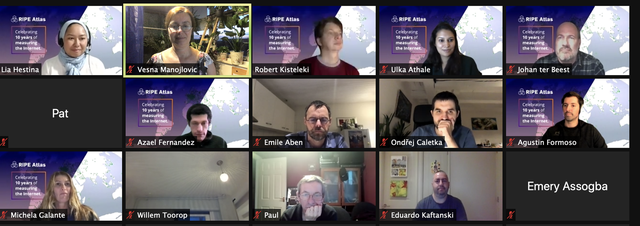
The RIPE Atlas Software Probe Deployathon was designed with the express goal of deploying as many “software probes” as possible. We also wanted to get old and new members of the community together in one virtual space so we could talk to them directly, get their feedback, and energise them into working together. After 10 years of RIPE Atlas, we know that the RIPE Atlas community has become a very strong and mature one, but it's important to keep reconnecting with “old” supporters and attracting new enthusiasts.
In all this, we succeeded. All across the community, there was a lot of buzz around the event before it even started, and one local community in Mexico organised their own pre-event!
Unlike our first “corona” hackathon, this event took place in just one day. Still, we decided to stretch the time limitations and cover several time zones across the course of that day. And since we were online, we were not limited with the space requirements, so we admitted everyone who registered. In total, we had 140 registrations!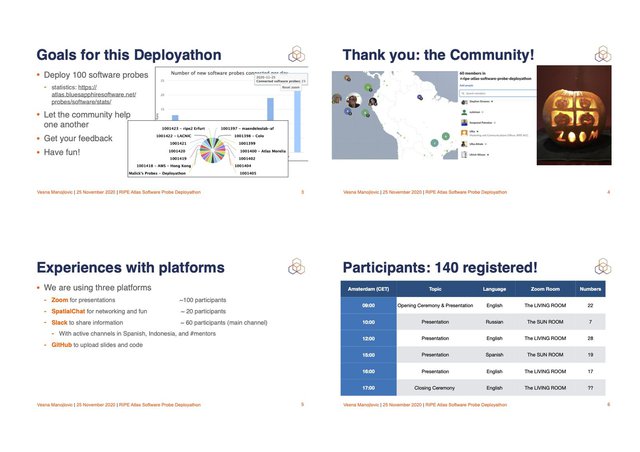
Selection of slides from the Closing Ceremony
Achievements
So our goal in the lead up to the Deployathon was to get 100 software probes connected. That was always meant to be madly ambitious, but best to aim high! In the end, on the day, we saw 34 software probes deployed. But as the average deployment rate is 7 probes per day, that was a considerable hike in the numbers. That's 34 new probes collecting sending data from 34 locations all across the globe!
In fact, the 100 or so people who took part on the day came from 30 different countries. Thirty! Of these, the top numbers were Mexico (17 participants), Indonesia (12), and Benin (7). We are delighted that so many people from such a diverse set of regions could come and get involved.
One of the most important achievements for us was that we got to engage with and get useful feedback from so many people. Many many many questions asked and answered, both by participants themselves (mentors) and by RIPE NCC staff. In all, we had 14 mentors from across the community helping out, each of whom received vouchers for “credits” and stroopwafels. There were dozens of new feature requests, several follow-up projects initiated, and a new page created to help people get statistics about SW probes.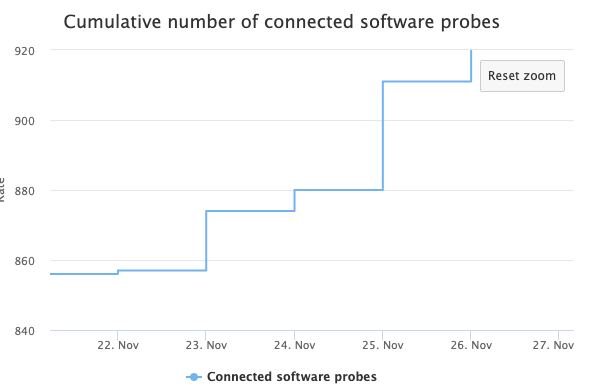
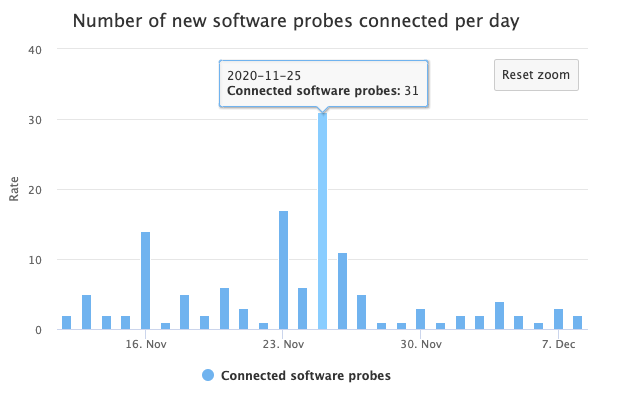
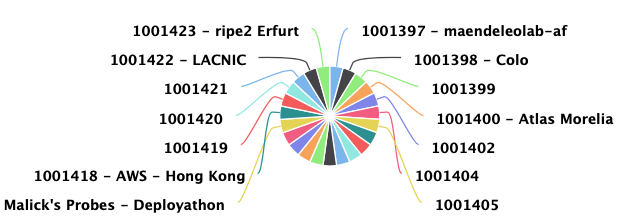
Some of the views on the number of probes deployed
Longer-term results, of course, are less tangible: among the most important are the goodwill created within the community and the “warm fuzzy feelings” shared by the participants. You can find the slides from the presentations on our hackathon GitHub pages
Features and Bugs
Some of the most interesting new features requests were as follows:
- Deploying on OpenWRT
- Have probes or anchors on RPKI invalid prefixes
- Nice to have: the post-install script prompt the user for the registration info (AS#, City, Country) and read the key and send every thing directly. This can be pushed further with some code that fetches all this info automatically from some IP/AS geolocation database.
- Include the software probe as a standard package on RING nodes.
- Several attempts to install RIPE Atlas SW using Docker on Raspbery PI - and it worked out!
- Use RIPE Atlas to do measurements in unused IPv4 space ( 0/8 , class D, class E)
We will be taking all these feature requests into consideration to work out which ones we can follow up on. And we'll be sure to report back through usual channels in 2021.
As well as features requested, there were also bugs spotted. Here are some of them -- thanks to everyone who reported them!
- Fixed the bug with “make: *** [Makefile:718: busybox_unstripped]” & stime
- Issue encountered during deployment was the building of the debian package
- this required a checkout of the devel branch of the github repo and the issuing of a git submodule update command (thanks @Philip Homburg)
- When pasting the key, I had to make it wider the text box, in order to accept it
- Improve documentation (clarify that the the public key of the software probe has to be filled-in in the registration form for the software probe, the need for sudo / to be root to run a number of the commands - splitting hairs maybe be no harm to explicitly call that out; …)
Special gratitude goes to two RIPE Atlas ambassadors: Carmen Denis and Azael Fernandez, who, with the help from LACNIC, attracted many participants to the event geared towards Spanish-speaking participants. Here's a video from those presentations.
Lessons Learned
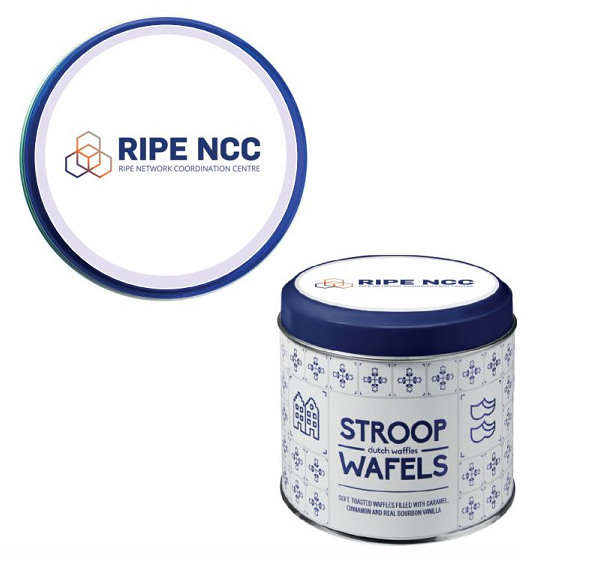
- Less is more: go for FEWER platforms, ideally only ONE platform
- Spread the event over multiple days, rather than multiple presentations within one day
- Order stroopwafels MUCH EARLIER!
This last point is about our traditional give-away during RIPE NCC hackathons: a traditional Dutch cookie called “syrup waffle”. Since we could not physically give anything to participants, I tried to arrange the online delivery - but the logistics of international shipping, combined with GDPR-requirements and limited budget were… challenging, at least!
So, if you think you were NOT informed about the voucher for receiving your sweet reward, please let me know by email, before Winter Solstice (22. December), and I might be able to do something about it.
Calls for Action
If you are inspired by this event, and want to take part, here are some ideas of what you can do:
Deploy more probes!
Here is a tool that gives you an overview, per country, how many probes are deployed: compared to the user density! And if we are looking for more IPv6 or IPv4 probes…
http://sg-pub.ripe.net/petros/population_coverage/table.html?sorts[IPv4+Public+Probes+%]=1
Maintain your existing probes
Geoloc: If you haven't done so, please make sure the geographical location of the software probe is accurate; if you move the probe, please update the geolocation manually.
Tags: You can mark your probe using “custom tags” to show which device and which platform it is running on. This might be helpful to other users, and researchers who want to schedule measurements from specific platforms.
Help us improve the documentation!
We are maintaining multi-lingual documentation on GitHub, add your own language!
Use RIPE Atlas data
If you'd like to see the measurements data of your own probe visualised on custom website, you can embed RIPEstat widget and point to your own probe (search for "atlas" on that page to learn more!) .
If you want to set up measurements form other probes, learn more here.
if you publish a scientific research paper, add it yourself to Wikipedia:
https://en.wikipedia.org/wiki/RIPE_Atlas#Research_papers
Tell the world about your RIPE Atlas user experience
We are always looking for the testimonials from our community. You can record a video or a podcast, write a blog post or RIPE Labs article, or even just mention us on social media: #RIPEAtlas , or Twitter: @RIPENCC .
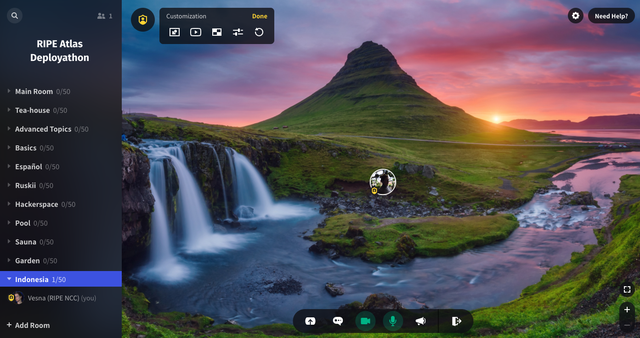
Beautiful background for the Indonesia "room" in SpatialChat
At the end of this unusual 2020, I wish you a much better 2021, stay in touch on the hackathons list, and see you in cyber-space!

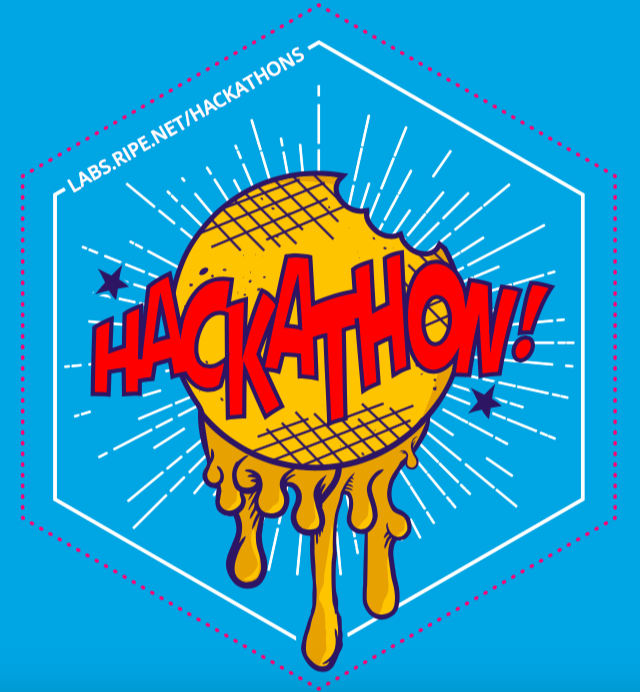
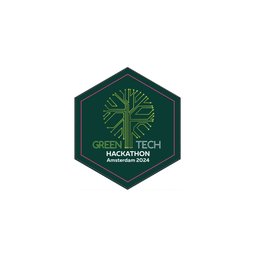
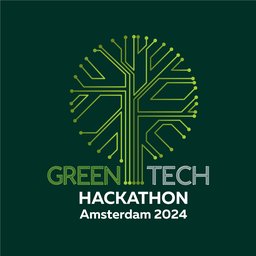
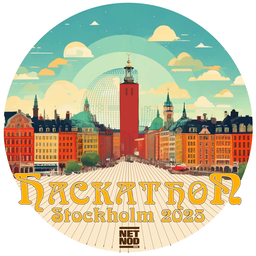
Comments 2
The comments section is closed for articles published more than a year ago. If you'd like to inform us of any issues, please contact us.
Julian Panke •
I have deployed a probe but forgot to register for Deployathon 😅
Charles Eckel •
Great post. Thanks for sharing. It is really helpful to hear both what worked well and what did not in order to help improve future events. That said, congrats on the great accomplishments of the breadth of participation.